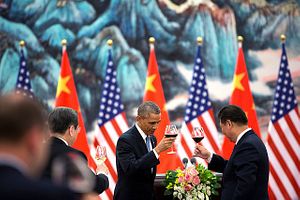The United States has repeatedly called for China to be integrated into the liberal international order. U.S. President Barack Obama, in an interview in November 2014, “absolutely” rejected the notion that the United States seeks to contain China, and instead stated that a principal goal of his administration’s China policy was to “integrate China into the global economy.” Various American international mavens, especially John Ikenberry, strongly favor this approach.
However, the Obama administration’s approach to the Trans-Pacific Partnership (TPP) suggests that the United States is less than welcoming of China’s integration. True, the then-Secretary of State Hillary Clinton stated in 2013, “We welcome the interest of any nation willing to meet the 21st century standards of the TPP—including China.” However, the United States standards of joining the TPP pose severe barriers to China’s participation. These include dramatically increased transparency, much higher labor and environmental standards, respect for human rights, and reducing trade barriers (which a Chinese official said were “an American trap for China, a threshold we can’t possibly reach”). It is like stating that a tiger is welcome into Noah’s ark—as soon as he changes his spots.
This is far from the only example of the United States’ ambivalence about China’s participation in the liberal international order. Although the US supported China’s accession to the World Trade Organization (WTO), the conditions of its accession were notably rather demanding; China had to make 685 commitments leading to 7,000 reductions in trade barriers, which amounted to “the most onerous requirements placed on any member to join the organization,” “steep,” and “the most onerous requirements placed on any member to join the organization.”
In the same vein, the U.S. found it difficult to accept changes in the World Bank’s voting structure to provide emerging economies such as China with influence more commensurate with their economic clout and contributions to the bank. So far such reforms resulted in only a 3.13 percent change in the balance of voting power between developed and emerging economies. (European states gave up some power, but the United States lost none of its voting share and maintains de facto veto power.)
At the International Monetary Fund (IMF), United States representatives agreed to reforms intended to offer China and other emerging economies greater voting shares, but the United States Congress have blocked ratification of these reforms.
One can argue whether China should be expected to simply join the international order and follow rules set by the United States decades ago, or is entitled to ask for some modifications, taking into accounts its values, interests, and contribution. However it seems unhelpful to repeatedly urge China to join the prevailing order, and then make it more difficult for it to join than it is for other nations.
Amitai Etzioni is a University Professor and Professor of International Relations at The George Washington University. He is also the author of numerous books, including most recently Privacy in a Cyber Age as well as The New Normal: Finding a Balance between Individual Rights and the Common Good.

































